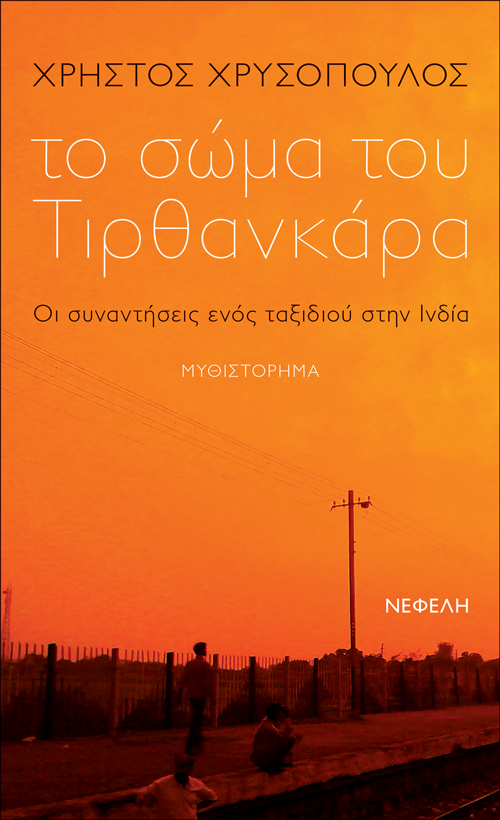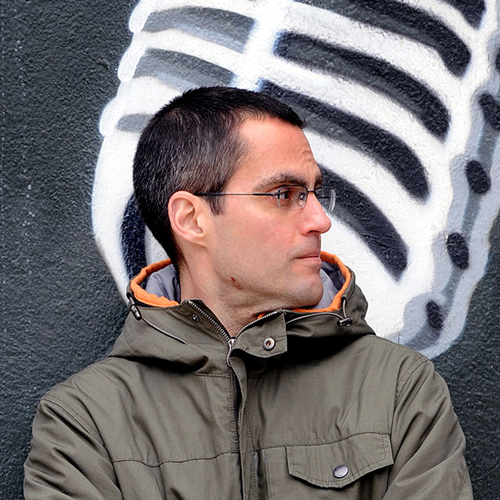The Body of Tirthankara
a novel by Christos Chrissopoulos
NEFELI publishing
English excerpts
Then I realized what it was I had discovered in India. Something that, for the first time, I could not bury beneath words: I was never really warm towards others, though I could sense their emotions and feelings. I was actually able to welcome excitement in myself, but at the same time, I was always putting my thoughts and feelings in parentheses. I was bringing objections to myself. I was a skeptic. That seemed self evident to me, as a writer. My training was keeping a distance. I could grasp, and had the ability to show others, that something seemingly simple and one-dimensional, is always complicated and difficult to comprehend.
Arriving in India, I knew that these skills would be insufficient. I knew I would not be able to analyze anything in depth. I would be limited to the surface. I would even doubt my own impressions, I didn't have the necessary knowledge, I lacked the appropriate conceptual framework. I was not an expert in India nor was I interested in becoming one. India would not tolerate my dialectics. That much I knew. What I had no knowledge of was how I would face the lack thereof. And so it was that I decided I would surrender myself to the journey. What does this mean, though? Whom do you surrender to, when you surrender yourself to the journey?
When you have no other means at your disposal for relating to the world, then, by necessity, you find recourse to your intuition, you learn to listen to that thwarted inner voice. This, then, is what India offered me: a regained confidence in the body. Most people mistake this for spirituality, but they are wrong. In essence, India is one of the most materialist of cultures.
I could hear my feet pleading pleading with me: "Please do not go there", or commanding me: "Go ahead". I did as I was told. I was letting my hands decide whether to pick something up or not. I did not deliberate about whether I could place my trust in a stranger or not. I would follow him. An inner urge was guiding my actions. I had no way to understand others – except through my senses and gut feeling. I was a fearless stranger amongst strangers. I was alienated.
This is exactly what a long journey really is: a succession of such incidents of seductive alienation. Events and circumstances gradually lose their importance. The same applies to people. As time passes, all the different people you meet seem to lose their distinct identity They become nameless, they are mere events on the road. Individuality disappears, people become indistiguishable. After a while, there is no more room for names in a traveller's mind. People become entries in memory's ledger.
Friendship is rare on long journeys. You meet a lot of people when you go from one place to another, but only fleetingly. It is not easy to make friends. This is another characteristic of the long journey. Everyone knows that you come from somewhere far away, and that you will eventually return there, and that in every place you only stay for a short while. You know as much yourself: no matter how generous you wish to be with people, you cannot offer them much more than a few shared moments.
In the end, your journey will become nothing more than a four word sentence: "I was there once."
As months go by, your memories of the trip become shorter. This is how the journey changes over time. It becomes asymmetric. Some things become foregrounded while others disappear. The journey, moreover, does not end with the return to your starting point. It continues in contemplation. It lives on, of its own accord. It changes. In a sense, the journey is aging along with the returned traveler. And so it should be. The journey always eventuates in the past. Its grammar won't tolerate any other tense than the past tense. The discerning traveller knows this rule - and will never breach it.

Christos Chrissopoulos
The Body of Tirthankara
a novel
ISBN: 978-960-504-114-4
Pages: 360
Dimensions: 12,2x20cm
Catalogue Price in GREECE (incl. VAT 6%): € 16,00
Series: Contemporary Greek Fiction
Design and typography: P. Douvitsas
PLEASE NOTE:
An earlier novel by Christos Chrissopoulos, The Parthenon Bomber, will be published by Penguin Random House in 2017 and was also published in France by Actes Sud in 2012.
Christos Chrissopoulos, born in 1968 in Athens, is a novelist and essayist. He has published fourteen books, most recently A Flashlight Between the Teeth (Polis, 2012), and The Body of Tirhtankara (Nefeli, 2014). He has received a number of grants and awards, including the Academy of Athens Prize in 2008 and the prizes Laure-Bataillon (France, 2013) and Balkanika (2015). His work is available in several languages. He teaches writing in Athens and is a member of the European Cultural Parliament (ECP).

